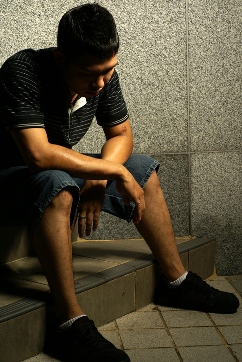Four types of abuse
There are four main types of abuse:
1. Physical abuse. Physical abuse can take a variety of forms:
- Physical violence Examples: a parent shaking and cursing his eight-year-old son's teammate or the Trumbull, Connecticut mother who, after a10-year-old boy checked her 7-year old son during a youth hockey game, grabbed the boy's helmeted head and began banging him against a Plexiglas partition along the rink until the player's mother interceded)
- Developmentally inappropriate training (Example: a parent who insists that his nine-year old daughter practice and play soccer two to three hours a week, six or seven days a week to the point that she suffers a severe overuse injury : a stress fracture of her pelvis);
- Using exercise as punishment (Example: the football coach who punishes players who don't hustle by requiring them to run laps around the field. This method of coaching, tried and true though it may be, is really child abuse);
- Requiring an athlete to practice or play hurt (Example: a father of a youth baseball player who demands that his son continue pitching in obvious pain because baseball is a "man's game").
- Depriving a child of proper rest, nutrition, or hydration (Example: a football coach who won't let his players stop to drink water or sports drinks on a 95-degree August day).
- Furnishing a child performance enhancing drugs or encouraging their use; and
- Hazing (Example: Girl's football players who forced five younger teammates to participate in a violent hazing ritual in which they suffered physical injuries).
2. Emotional abuse: Emotional abuse is any attitude or behavior by any person in a position of power, authority, or trust, such as a parent, coach or official, or even another player or someone vying for a position on the same team, which interferes with a child's mental and social health and development, including attacks on a child's self worth and esteem. This form of abuse occurs even if the attack is intended as a form of discipline or is not intended by the adult to cause harm. It also includes the failure to provide the support necessary for the development of a child's emotional, social, physical and intellectual well-being, such as, for example, a coach giving other players preferential treatment, persistent benching and failing to abide by the league rules on fair and/or playing time Like physical abuse, emotional abuse can take many forms:
- Harassing
- Yelling
- Name calling
- Threatening
- Insulting

- Criticizing
- Shaming
- Ridiculing
- Intimidating
- Hazing
- Teasing, taunting or bullying
- Negative questioning (Example "Why did you miss that open shot on goal?" or "How could you let that guy beat you?").
- Shunning or withholding love or affection
- Punishing a child for losing/failure to perform up to adult expectations
3. Sexual abuse: Sexual abuse occurs when a person in a position of power, authority or trust, including a parent, coach, or another teammate, engages in any sexual act with a child.








